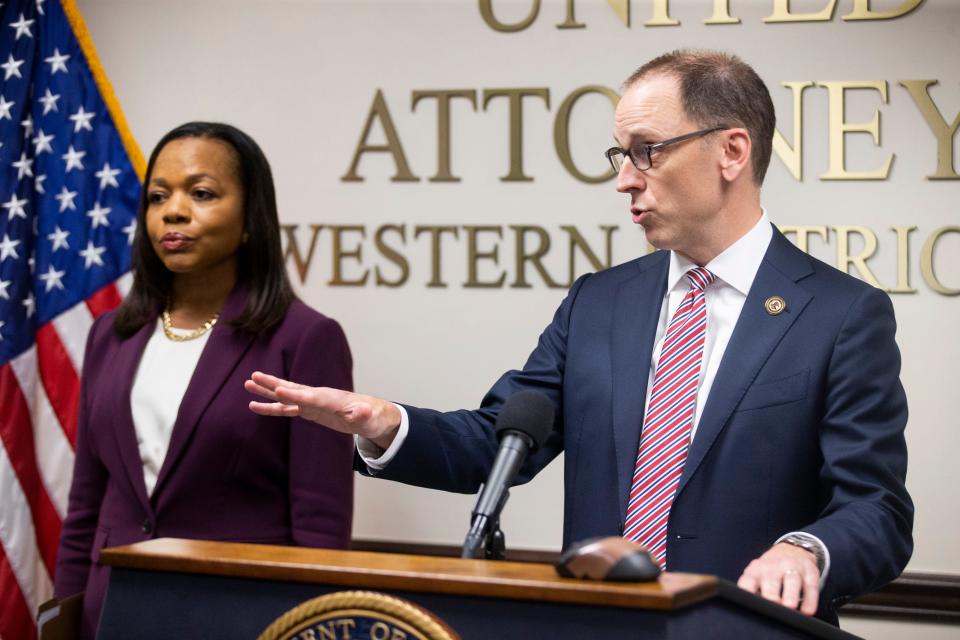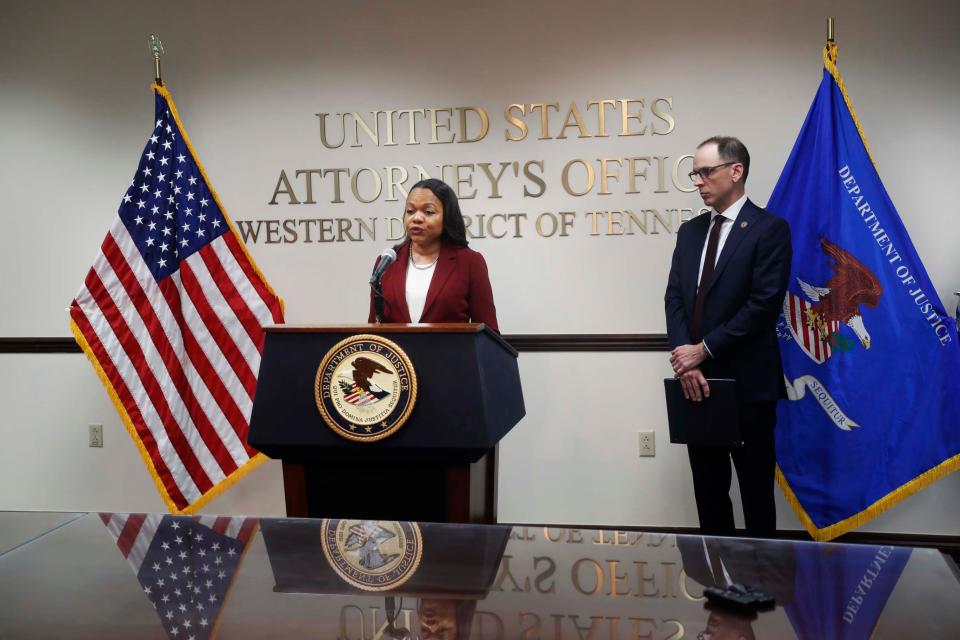DOJ: Tennessee's aggravated prostitution law discriminates against people with HIV, AIDS

The Tennessee Bureau of Investigation and Shelby County District Attorney's Office violated the Americans with Disabilities Act by enforcing Tennessee's aggravated prostitution law against people living with HIV, the U.S. Department of Justice said Friday.
According to the DOJ, the DA's office enforced harsher criminal penalties on those who are HIV positive solely because they have been diagnosed with HIV.
"Tennessee’s aggravated prostitution law is outdated, has no basis in science, discourages testing and further marginalizes people living with HIV," Assistant Attorney General Kristen Clarke of the Justice Department’s Civil Rights Division said in a press release. "People living with HIV should not be treated as violent sex offenders for the rest of their lives solely because of their HIV status. The Justice Department is committed to ensuring that people with disabilities are protected from discrimination."
The announcement from the DOJ comes just over a month after multiple organizations — including the American Civil Liberties Union, the Transgender Law Center and the ACLU of Tennessee — filed a federal lawsuit in Memphis on behalf of four "Jane Doe" plaintiffs and OutMemphis, a local nonprofit that serves the LGBTQ community, claiming the law violated the ADA.
"OUTMemphis welcomes the DOJ’s findings that, through its outdated and punitive Aggravated Prostitution law, Tennessee is discriminating against people living with HIV," said Molly Quinn, the executive director for OUTMemphis. "We agree, and that’s why we are suing to get the law struck down. Whether this issue is resolved informally or in court, it is long past time to end HIV criminalization."
The announcement, which came on World AIDS Day, was welcomed by the ACLU.

"Laws that criminalize people with HIV are biased, baseless, and do nothing to mitigate the spread of HIV," said Rachel Meeropol, the ALCU's senior staff attorney for its racial justice program. "This World AIDS Day, we welcome DOJ's support in our challenge against TN's dangerous and discriminatory law."
The DOJ, the department said in a press release, conducted a "comprehensive investigation" into the law and enforcement of the law which elevates "what would otherwise be misdemeanor conduct to a felony because the individual has HIV, regardless of any actual risk of harm."
Someone convicted of aggravated prostitution faces between three and 15 years in prison and a fine of up to $10,000. The DOJ said a person convicted of a misdemeanor for the same conduct would be sentenced to six months or less in prison and a $500 fine.
"While the aggravated prostitution statute applies statewide, it has been enforced most frequently in Shelby County," the DOJ said in its press release, with a detailed letter from the department saying that nearly 74% of the people on the registry for aggravated prostitution were from Shelby County.
The law also constitutes a "violent sexual offense," which requires someone convicted to register with the sex offender registry, which is maintained through TBI.

"Individuals placed on the registry due to convictions for aggravated prostitution are restricted in where they may live, work and go in public, and have experienced increased homelessness and unemployment. These individuals also face public disclosure of information about their HIV status, which can lead to harassment and discrimination," the department said. "The department opened this investigation in response to complaints about enforcement of the statute."
The government also noted that developments in viral suppression medication for people diagnosed with HIV have advanced to a point where, according to the Centers for Disease Control and Prevention, more than half of people living with HIV are virally suppressed, meaning they cannot transmit the virus. The law, and similar ones across the country, was established "when 'very little' was known about HIV transmission and treatment."
The DOJ said, in the letter detailing the investigation, the DA’s office and TBI “should promptly implement” multiple “minimal” measures. For the DA’s office, this included not enforcing the aggravated prostitution statute, adopting a policy that explicitly states the office will not discriminate against HIV-positive individuals, “take steps to rectify” the consequences of cases previously prosecuted and training all attorneys on HIV.
More: Federal HIV funding rerouted to nonprofits, bypasses Tennessee health department entirely
TBI also stopped enforcing the law, including enforcement of sex offender registry requirements. In addition to that, TBI was told to remove all people from the sex offender registry who were listed solely due to an aggravated prostitution conviction.
Along with removing those people from the registry, the DOJ said TBI should “expunge” any record of them being listed in the registry.
After removing them, TBI was told to inform those people that they have been removed from the registry.
The Tennessee Attorney General also was requested to “issue an advisory opinion stating that enforcement of the aggravated prostitution statute and its related [sex offender registry] requirements violate the ADA” and to circulate it statewide.
The DOJ also asked Governor Bill Lee to request a repeal of the law, and for the state to pay “compensatory damages to aggrieved individuals for injuries caused by the enforcement” of the law.
More: Tennessee made 'a disastrous move' on HIV, Shelby County mayor says. So what now?
The government, finally, requested that a written status report be created to list what measures were taken to comply with those requirements.
TBI could not comment on the DOJ's findings, but said that it had received its letter and said it "follows state law, as written."
The DA's office said all of the aggravated prostitution listed in the letter from the DOJ took place prior to August 2022, when Shelby County DA Steve Mulroy took office, and that they're looking to find out if any of those cases have been prosecuted since Mulroy took office.
"However, once our office was made aware, we let the DOJ know that we would fully cooperate and we will continue to do so," the office said in an email statement.
Lucas Finton is a criminal justice reporter with The Commercial Appeal. He can be reached at Lucas.Finton@commercialappeal.com, or (901)208-3922, and followed on X, formerly known as Twitter, @LucasFinton.
This article originally appeared on Memphis Commercial Appeal: DOJ finds state's aggravated prostitution law discriminatory

